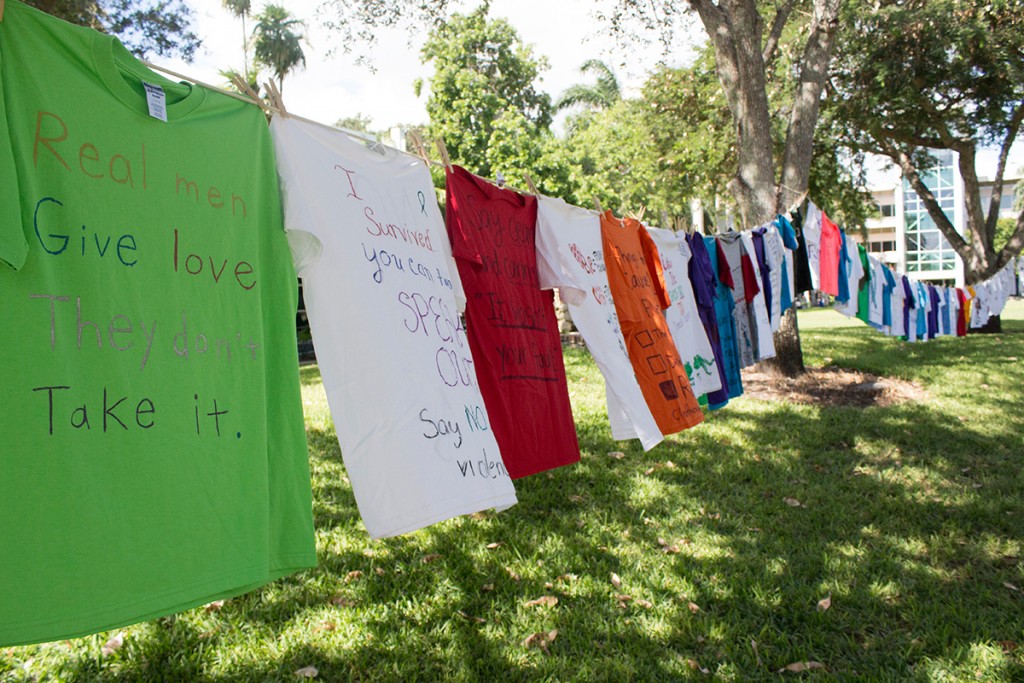Hanging on a clothesline over the Foote Green Wednesday was a sign that highlighted staggering figures on domestic violence and abuse: 51,000 women were killed by men close to them during the same time that 58,000 soldiers died in the Vietnam War.
The Counseling Outreach Peer Education group (COPE) partnered with Safespace Foundation Inc., a women’s shelter, to host the Clothesline Project to raise awareness of sexual assault and domestic violence at UM. The event showcased T-shirts with messages of hope, such as “You Can Be a Survivor Too,” and other T-shirts that told survivors’ stories on the Foote Green.
The first time COPE hosted the project was in 2011, when they had to fly in shirts from other universities in order to have a display. This year, the shirts came from UM and represented personal community stories.
The clothesline represents the historic sharing of stories between women. When women who lived in close proximity did laundry, they would share their experiences with one another, according to the event’s organizers. This fostered an environment where women could educate each other and raise awareness about community issues. That is one of the main goals of the Clothesline Project.
“I’m hoping to open up students’ eyes in that violence against women is a very real issue, even if it’s not something that we might encounter every day,” said COPE Outreach Programming Co-chair Sabrina Xiao. “I hope that students will walk away with the sentiment of ‘Canes Care For Canes’ reinforced. We have to all look out for each other.”
The shirts hanging on the line represented different types of victims and survivors. White shirts represented women who had died from violence; yellow and beige represented women who had been battered or abused; red, pink and orange represented women who are survivors of rape and sexual abuse; blue and green represented survivors of incest and sexual abuse; purple and lavender represented women who were attacked because of their sexual orientation, and black shirts represented women attacked for political reasons. The shirts emphasized that these experiences impact women we sit next to in class and pass by every day.

Graduate student Yuxuan Xie sat on the grass and took a picture with a red shirt that said, “You aren’t alone.” Xie said that it spoke to her because it reminds people to open their hearts to help instead of hiding.
“It is very important for people to write these words,” she said. “It helps people to understand that this violence is really happening.”
This is why senior Kathryn Louis volunteers with COPE.
“I want to reduce the stigma with getting help,” she said.
“The Clothesline Project touches upon sensitive topics including sexual and physical abuse. Thus, I hope to not just raise awareness regarding violence against women, but to encourage survivors of abuse to come forward and seek the help they need,” said COPE Outreach Programming Co-chair Yusuf Ali.
Outreach Coordinator, COPE Advisor and therapist Kim Martin said the event attracted less attention than it has in previous years. Her goals for next year include increasing survivor testimony and participation of student organizations from all sectors of campus.
“Unfortunately, there are still far too many victims of abuse that don’t feel comfortable seeking the help they need because of fear of stigmatization or judgement,” Ali said. “By opening dialogue via the Clothesline Project, I hope to break down some of these barriers.”
Martin believes that students in college find it harder to discuss vulnerability and share their stories.
“Social media inhibits talking,” she said. “I think people want to share but don’t know how to or are convinced they have to keep up a certain persona.”
Martin and the rest of the COPE team hope that, by allowing survivors to be anonymously vulnerable, they are encouraging women to share their bravery and strength with others.





